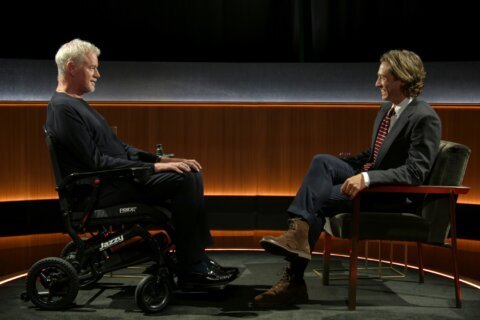WASHINGTON — Stephen King may be the most prolific author of book-to-film adaptations, from “Carrie” (1976) to “Misery” (1990) to “The Shining” (1980). Even his short stories have sparked big-screen gems, from “Stand By Me” (1986) to “The Shawshank Redemption” (1994).
So it’s profoundly disappointing to find that Hollywood just botched its attempt to adapt King’s self-proclaimed “magnum opus,” his epic eight-novel sci-fi series “The Dark Tower.” Rather than faithfully follow each book over eight distinct movies, this supposed franchise-starter throws all eight books into a blender and sees which elements will stick on screen.
Opening in New York City, 11-year-old Jake Chambers (Tom Taylor) is a social outcast who sketches otherworldly images from recurring nightmares. His mother (Katheryn Winnick) thinks he’s having trouble coping with his father’s death, but the images turn out to be real depictions of Mid-World, a far-off land resembling the Old West with futuristic qualities.
Before long, Jake is pulled into Mid-World to help aging marksman Roland Deschain aka The Gunslinger (Idris Elba) in his battle against evil sorcerer Walter O’Dim aka The Man in Black (Matthew McConaughey), who’s trying to destroy a tall Dark Tower that binds the universe.
This setup is intriguing for the first 15 minutes. We watch with curiosity as Jake uses his “shine” (i.e. Danny Torrance) to sketch premonitions of a supernatural tower like Richard Dreyfuss in “Close Encounters of the Third Kind” (1977). Even when Walter’s henchmen show up disguised with sewn-on skin, the suspense is effective thanks to Ella Gabriel, who deserves praise for her brief yet creepy performance akin to Billie Whitelaw in “The Omen” (1976).
This early potential builds until Jake arrives at an abandoned Brooklyn mansion, where he conveniently knows the password for a device that opens a portal to an alternate dimension. Even so, we the viewers are still on board as Jake steps toward the portal — until a fake-looking special effect brings the floorboards to life in a CGI tornado that breaks our spell.
By this point, you’ll realize that the movie is already charting a different path from the books. In the series’ first novel, Jake enters Mid-World via death, pushed in front of traffic by The Man in Black. The Gunslinger only stumbles upon Jake at a weigh station in Mid-World, before ultimately sacrificing the kid at the end of the first book by letting him fall into the abyss.
Why on (Keystone) Earth would the filmmakers turn Jake into the main character? It’s an odd decision to tell the film through a kid’s eyes when you already have an epic, adult struggle between Golden Globe winner Idris Elba (“Luther”) and Oscar winner Matthew McConaughey (“Dallas Buyers Club”). Thus, the story becomes unnecessarily dumbed-down into child’s play.
It’s not that Taylor is a bad child actor; he finds charming chemistry with Elba in fish-out-of-water moments. After “Thor” (2011) and “Wonder Woman” (2017), such scenes have become a genre staple, as Elba interacts with hospital nurses, a gun shop owner and a hot-dog vendor. While these gags aim for our funny bone, Elba later hits our hearts with his spiritual mantra:
“I do not aim with my hand; he who aims with his hand has forgotten the face of his father. I aim with my eye. I do not shoot with my hand; he who shoots with his hand has forgotten the face of his father. I shoot with my mind. I do not kill with my gun; he who kills with his gun has forgotten the face of his father. I kill with my heart.”
Elba is tailor-made for such stoicism, demonstrating calm, poise and self-control amid the apocalyptic chaos. McConaughey takes the exact opposite approach, going for broke as the sinister villain, whispering in victims’ ears to “stop breathing.” The first few times they collapse, it’s pretty badass, but the more he uses his tricks, he becomes too omnipresent, appearing everywhere and disposing his foes so swiftly that we wonder why he doesn’t just end it all.
The problem isn’t McConaughey’s commitment to the performance, it’s the silly situations he’s placed in. Note the way he casually cooks in Winnick’s kitchen compared to the terrifying breaking-and-entering of an underwear-clad Donnie Wahlberg in “The Sixth Sense” (1999). His speeches are too cute by half, speaking dialogue filled with exposition to explain the “rules of magic” in this fantasy world, cobbling bits from all the books, including Arthurian legend.
It’s quite literally “too many cooks in the kitchen.” The script was initially conceived by “Lost” alums Carlton Cruse and Damon Lindelof for director J.J. Abrams. Next, Ron Howard brought in Oscar-winner Akiva Goldsman (“A Beautiful Mind”) to rewrite it with Jeff Pinkner (“The Amazing Spider-Man”). Finally, Danish screenwriter Anders Thomas Jensen (“Brothers”) and writer/director Nikolaj Arcel (“Girl with the Dragon Tattoo”) rewrote the current version.
This isn’t a case of a writer who has no business directing; quite the contrary, Arcel has five features under his belt, including Alicia Vikander in “A Royal Affair” (2012). In “Dark Tower,” Arcel delivers some inspired touches, from the steam-punk atmospherics, to memorable insert shots, from nightmarish flashes, to symbolic parallels to the World Trade Center.
No, the collapse of “Dark Tower” isn’t Arcel’s fault; the project was doomed from the start, over-managed by a studio that couldn’t pick a perspective. As a result, the film is a blended mess with an unclear protagonist, confusing jumps between the natural and supernatural worlds, and a slew of random monsters that show up like an unwelcome creature feature.
In the end, it feels like a 50-pound story in a 5-pound bag, featuring way too much world-building for a 95-minute movie. It’s the opposite problem of Peter Jackson’s “The Hobbit” prequels, which took one small book and stretched it out over three long movies, while “The Dark Tower” takes elements from all eight novels and crams them into one short movie.
Here’s hoping the upcoming TV series format allows more breathing room. Until then, we’re left with a hodgepodge that’ll confuse newcomers and disappoint fans. To paraphrase The Gunslinger’s mantra, Hollywood aimed with its hand but forgot the face of its story’s father.









